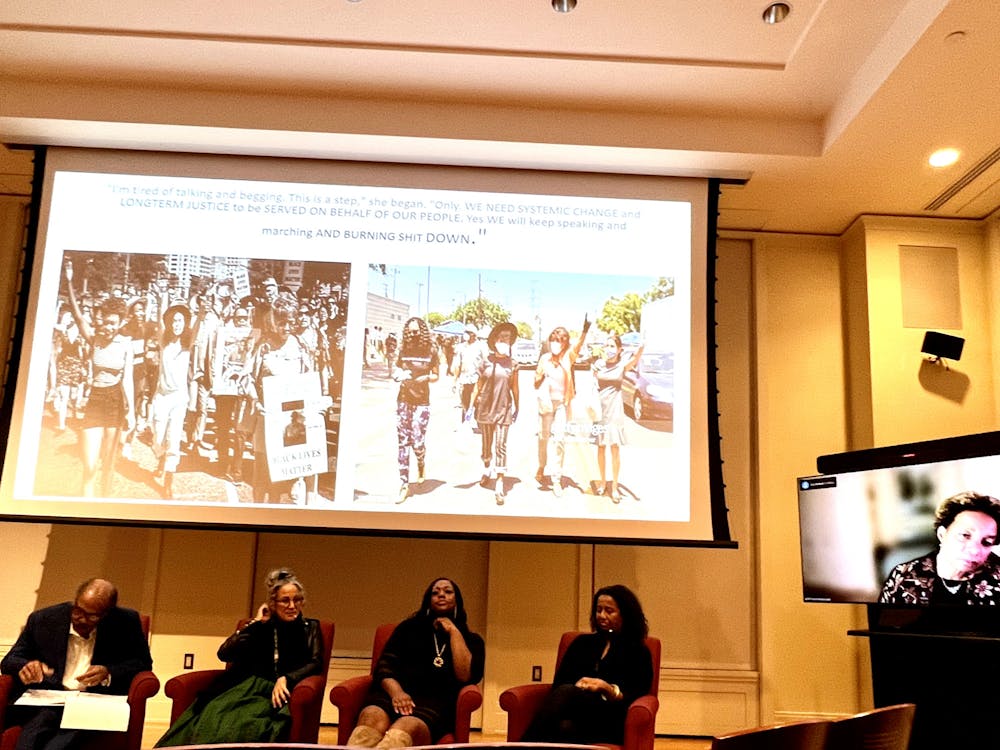The Alexander Grass Humanities Institute at Hopkins hosted an intersectional discussion about systemic oppression in the U.S. on Nov. 4. The panel discussion featured Daughters of the Movement, a group of women whose parents were on the front lines of the civil rights movement.
The discussion was moderated by Ernest J. Quarles, an attorney and faculty member at Hopkins. He began the conversation by highlighting the importance of an open discussion involving female activists.
Panelist Dominique Sharpton, an actress, producer and daughter of Al Sharpton, described the legacy of her father and the rise of her social consciousness. Sharpton shared her experience as a child, where her father could not be present at her graduation or other school events because he was working with families who lost their children to racial injustice.
“Understanding that he was committed to a bigger cause that included all of us, our whole family, was something that has always been instilled in me,” she said.
Panelist Suzanne Kay, writer, filmmaker and the daughter of the late actress Diahann Carroll, commented on the wealth disparity in the U.S. According to Kay, many white families have built their wealth on real estate by forcing Black buyers, like her mother, into signing a racially influenced contract where the buyer had to sell the property back to the seller at the market rate at the time of purchasing.
“That was the first time I understood that it didn't matter who you are, what power you had, whatever,“ she said. “That was one moment that really turned me towards understanding the fight we were still up against.”
Panelist Hasna Muhammad, a visual artist, writer, educator and the daughter of the late actress Ruby Dee, emphasized the importance of being vocal and speaking out.
“As the centuries of enslavement progressed, ‘Keep your mouth shut’ was the answer for survival,“ she said. “You see what happened in 2020 all over the damn world, we weren't keeping our mouths shut, we were yelling and screaming and we were in the street. We are in a state where silence is no longer going to be accepted.”
Agreeing with Muhammad, Sharpton stressed the importance of employing a strategic approach to raising voices. She used the death of George Floyd to emphasize the need for the movement to push for relevant legislation concerning police misconduct.
Panelist Gina Belafonte, daughter of singer Harry Belafonte and the executive director of the non-profit Sankofa.org, discussed ways to promote activism through artistic creativity.
“We'll create a piece of art, poetry, music [or] something that will inspire and uplift the community toward change,“ she said. “It's the artists that will capture what many of the activists are doing and help bring [the] legacy to those moments in places where many of our leaders who are putting their bodies on the line need to never be forgotten.”
The speakers also spoke on the responsibilities of higher education institutions in creating an anti-racist community. Quarles cited Brown University’s Undocumented, First-Generation College, and Low-Income (U-FLi) Student Center as a positive example of an initiative toward economic and immigrant justice.
Muhammad believes that student loan exemption is key to progressing towards equity.
“Anybody who wanted to go to school for any type of study could do so without the monetary burden that so many of us have to deal with. It would raise the communities. It would change the world.” she said.
Sharpton emphasized the importance of redefining traditional societal values. According to her, titles such as PhD and Academy Awards are tools created by white institutions to promote a certain type of behavior.
“White institutions created these stamps, so that they are considered smart, valuable [and] they get the best job. What if we question and redefine who is smart and don't go after these things?” she said.
In an interview with The News-Letter, Deidra Roach, a Maryland resident who attended the panel discussion, described how the event gave her new perspectives on the importance of education in mitigating racial prejudice.
“It is absolutely necessary for us, [for] the survival of our species, that we teach our young people compassion and to think larger than themselves. Hopefully [teaching compassion] can also be introduced to institutional curriculums,” she said.
Roach referred to the example Kay shared about the Japanese documentary Children Full of Life, where schoolchildren were guided by their teachers to understand how to show empathy in a classroom environment.
Mary Townes, a social worker for Baltimore City who attended the panel discussion, emphasized the importance of solidarity between different communities in an interview with The News-Letter.
“It's gonna have to be everybody involved, no matter where you come from, who you are — Black community, white community, Hispanic, whatever. We need to come together and make this thing work,” she said.
Belafonte concluded the discussion with her outlook for more open conversations in the future.
“We need an initiative where we can really bring opposing forces to have an opportunity to reconcile around the truth,” she said. “Their individual truths because there are two Americas, and we need to be having conversations with each other.”





